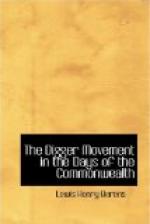The religious issues of the great struggle, however, were by no means so simple. Episcopacy, as it had existed, had few supporters in England outside the ranks of the bishops. The Laudian coercion had not only reawakened slumbering animosities and given renewed vigour to the Puritan dislike of the forms and ceremonies of the Anglican Church, but had served to fill men’s minds with a healthy, vigorous, and deep-rooted distrust of ecclesiastical government in any form. To any claims, whether of kings or of bishops or of presbyters, to rule by Divine right, the ear of the nation was temporarily closed. If Protestants of all shades of opinions had learned to distrust Episcopacy, intellectual men of all shades of religious beliefs, and of none, equally distrusted Presbyterianism, and feared that the free play of intellectual life would be as much endangered by the rule of the presbyters as by the rule of the bishops. We should, however, do well to remember that at the outbreak of the war most of the great Parliamentary leaders, including Pym, Hampden, and even Cromwell, had no deep-rooted objection to Episcopacy as a form of Church government, provided only that it was controlled by Parliament, and allowed the fullest possible liberty of conscience. They all shared Pym’s expressed conviction that “the greatest liberty of the kingdom is religion,” and seemed to have inclined toward the ideal of Chillingworth, a full liberty of thought maintained within the unity of the Church. It was their necessity, not their will, the necessity to gain the cordial co-operation of the Scotch, that later compelled them to commit themselves to Presbyterianism, of their profound distrust of which they gave repeated proof. And it is worthy of special note that even in the time of their greatest need the English Parliament, to use Gardiner’s words,[31:1] “was as disinclined as the Tudor kings had ever been to allow the establishment in England of a Church system claiming to exist by Divine right, or by any right whatever independent of the State.”




